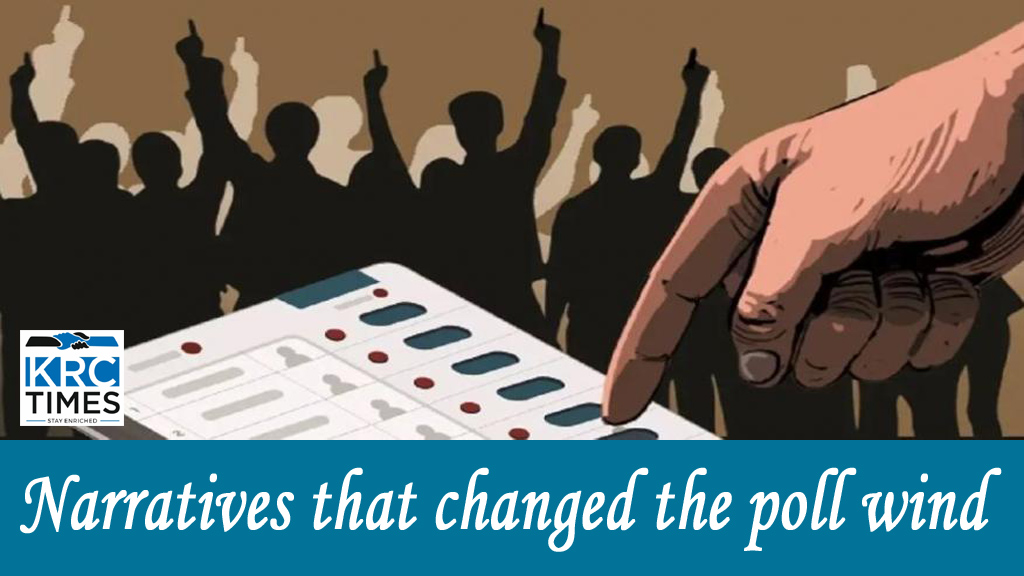While in a democracy the voter is the kingmaker, the electoral setback forced the Modi fan club to introspect
 KRC TIMES Desk
KRC TIMES Desk

Why didn’t the BJP meet its expectations in the recent Lok Sabha elections? While Narendra Modi’s opponents celebrate for apparent reasons, the results have undoubtedly left BJP supporters surprised, stunned, or both.
For many of Modi’s supporters, ‘Abki baar, 400 paar’ was a battle cry, a motivational prop for an ambitious target. A comfortable majority was, however, taken for granted. The 240 tally left them bewildered, scurrying for reasons responsible for this unexpected poll outcome.
While in a democracy the voter is the kingmaker, the electoral setback forced the Modi fan club to introspect. The unexpected loss was attributed to several factors, including alienation of party karyakartas because of their neglect by leaders, selection of bad candidates, wholesale lateral entry of outsiders to the fold, resulting in heartburn in cadres, and alleged indifference of the RSS to the election process.
Some of these reasons are valid but hardly impact the poll outcome. Were Congress and other constituents of the INDI Alliance free from these faults? Was everything hunky-dory with the BJP during the 2019 polls? In this respect, 2024 wasn’t very different from 2019.
Didn’t such a problem exist in states such as Himachal Pradesh, Uttarakhand, Delhi, Tripura and Madhya Pradesh, where the party won all seats? Or in Chhattisgarh, Gujarat, and Odisha, the states where the BJP performed equally well?
What explains the abysmal results of Uttar Pradesh, Maharashtra and West Bengal? There is something more than meets the eye. Apart from issues such as caste matrix, jobs and price rise, the opposition’s deftness in building a convincing narrative gave a surprising twist to the poll outcome.
A confident Modi banked on his achievements to win a third term. But his opponents—a pack consisting of Islamists, leftists, evangelists, dynastic parties and foreign powers inimical to India—engaged him on a different turf. They successfully moved the debate from the performance of his 10 years in office to a clutch of acerbic narratives, in which they excel.
While the 2014 BJP victory was a surprise, the 2019 one shocked the pack. Modi’s onslaught on poverty, war against corruption, ruthless elimination of terror, high economic growth, restoration of normalcy in Kashmir without firing a shot and India’s growing stature in the comity of nations rattled them. It was clear: India was on an ascent, and the electorate wanted PM Modi to stay for long.
Apart from dynastic political parties, the narratives against Modi were set by a pack of foreign-funded NGOs, media, and academia sections rooted in the leftist lexicon. This pack, wired with global institutions, uses wokeism and time-tested toolkits to manipulate the system, influence public discourse and meet its ideological ends.

The BJP losses were directly proportional to how the insidious narratives impacted voters, which differed from state to state. Modi’s performance was pitted against a manufactured perception and propaganda that spun narratives based on unfounded prejudices, unsubstantiated allegations, white lies and half-truths. The pack stoked fear in vulnerable sections of society.
The opposition narrative rested on five key points. First, the BJP would change and “end” the Constitution. Second, Modi controlled all constitutional institutions, including the Election Commission. Third, the BJP was persecuting minorities. Fourth, Modi was a friend of the rich and an enemy of the poor. Fifth, Modi would finish reservations for scheduled castes and tribes.
Changing the Constitution is no big deal. The document, a cornerstone of our democracy, has been amended over 100 times since it was adopted, mainly during Congress regimes. Amending the Constitution isn’t the same as finishing it. Ending existing reservations for any section was a false alarm. RSS chief Mohan Bhagwat has repeatedly said reservations would continue till discrimination against weaker sections doesn’t end. PM Modi, too, has spoken in the same vein many times.
The recent results have proved that the allegations against the Election Commission and questions on the credibility of electronic voting machines were part of a conspiracy to delegitimise Modi.
The rich-poor binary was baseless; the biggest beneficiaries of the Modi regime are the poor. According to the IMF, India has sharply brought down extreme poverty. Another World Bank working paper said that the number of those suffering extreme poverty in India dropped from 22.5 percent in 2011 to 10.2 percent in 2019.
When we speak of atrocities on minorities, we seem not to remember the murders of Hafizul Sheikh (West Bengal, 2024), Aijaz Ahmad Sheikh (J&K, 2024), Babar Ali (Uttar Pradesh, 2022), and Sheikh Waseem Bari (J&K, 2020). Is it because they chose to be aligned with the BJP? Did their blood matter any less for it?
The opposition narrative about saving democracy, institutions and constitution is a sham. The opposition is fighting to save political dynasties and the corrupt within its ranks. Delhi Chief Minister Arvind Kejriwal claimed that an election victory for the opposition would result in his release from jail.
Modi’s welfarism covered all 140 crore Indians without any discrimination whatsoever. Still, Muslims do have grievances against him, the way they had against the Congress during the pre-partition era. Those in doubt can refer to the Pirpur Committee report published by the Muslim League in 1938. It implied that Hindus, Hindu communalism, and the Congress were synonymous. This report was later used to argue for the partition of India.
The hard fact is that BJP-RSS were resting on their laurels too soon. Comparatively easy victories in 2014 and 2019 had turned them smug. They had won a battle, but not the war to retrieve India from a colonial narrative, a British legacy.
Narrative is a powerful instrument. It has successfully laundered the Communists of their sin of supporting the vivisection of the country based on religion and transforming them into secular icons. Rahul Gandhi, a product of dynastic politics who remote-controlled the UPA 1 and 2 governments without any accountability, is a poster boy of democracy and social justice.
The ones dividing Indians on the basis of caste and mocking Hinduism carry the ‘secular’ moniker. That’s the power of narrative—something the Modi clan didn’t realise and paid heavily for.


